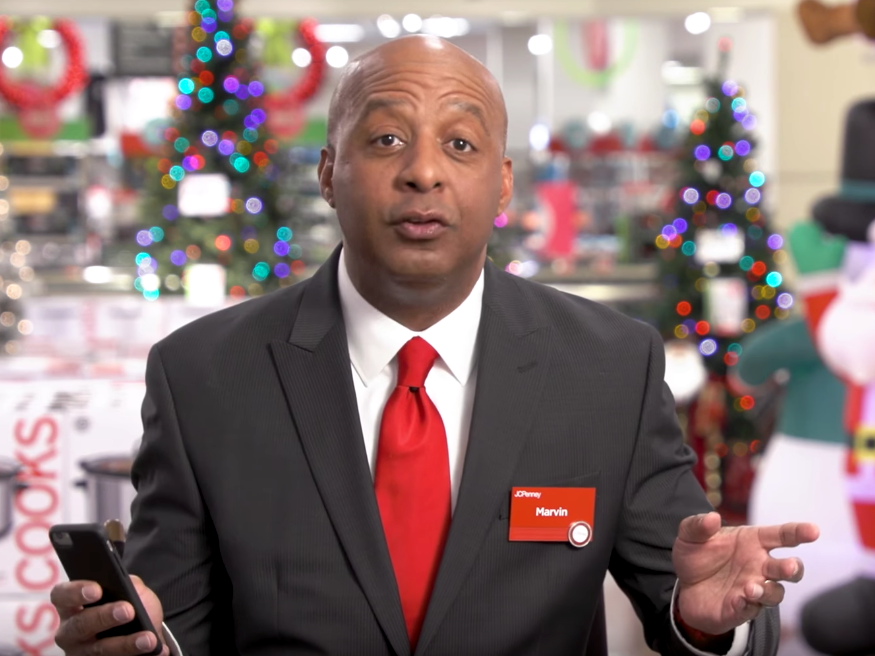- JCPenney’s stock price fell by as much as 8% on Tuesday morning following news that CEO Marvin Ellison would leave the company to lead the home-improvement retailer Lowe’s.
- Ellison, who became the CEO of JCPenney in 2015 after a 12-year stint at Home Depot, was tasked with bringing the department store back from the brink of financial disaster.
- Analysts say his departure could signal a lack of confidence in JCPenney – and in department stores in general – as he jumps ship to a more Amazon-proof business.
JCPenney’s stock price dropped by as much as 8% on Tuesday morning following news that CEO Marvin Ellison would leave the company to lead the home-improvement retailer Lowe’s.
Analysts say Ellison’s sudden departure could signal his lack of confidence in JCPenney and department stores generally as he jumps ship to an area of retail that has been deemed more Amazon-proof.
“Ellison’s exit will raise speculation that he is not particularly optimistic about the future prospects of JCPenney and sees the grass as being greener at Lowe’s,” Neil Saunders of GlobalData Retail said in a note to clients on Tuesday.
Ellison, who became the CEO of JCPenney in 2015 after a 12-year stint at Home Depot, was tasked with bringing the department store back from the brink of disaster. His immediate predecessor, Ron Johnson, tried to make the store more upmarket but alienated core customers in the process, leading to a $1.42 billion operating loss in 2013 and nearly $5 billion of debt.
With Ellison at the helm, JCPenney has undergone a turnaround, and sales stabilized. The retailer has increased traffic to stores by reintroducing appliances to capitalize on Sears' declining sales, expanded its private-label collection, and added Sephora pop-up shops to more stores.
"This is arguably the most challenging and competitive retail market that we've seen in over 50 years," Ellison said in a call with investors less than a week ago.
He added: "Retail in the US is a multitrillion-dollar industry, and we believe there could be multiple winners. Those retailers who can offer their customers a value while providing the best in-store and online experience will be winners. And as a company, JCPenney plans to be one of those winners."
But the store has been crippled by a heavy debt load and struggled to find its place in the retail landscape.
"JCPenney hasn't created an experience that solidifies a place in consumers' shopping habits," Kathy Gersch, the executive vice president of the consultancy firm Kotter, told Business Insider. "From a consumer standpoint, it shares some of the same challenges as Sears, as both have come from being old heritage retailers that were once the only place to shop in a town."
Ellison heads for a thriving area of retail
Meanwhile, home-improvement stores have become one of the few spots in retail that are less vulnerable to the threat of Amazon, whose attempt to take over the space with Amazon Local Services (later renamed Amazon Home Services) never took off.
Home improvement is considered a shopping experience that is harder to replicate online. Shoppers tend to value the ability to buy home-improvement products in stores and to talk to sales assistants before they do so.
A recent survey by Bank of America found that most of the 1,000 millennials surveyed "overwhelmingly purchase most or all of their home improvement products in-store," the analyst Elizabeth Suzuki said. The majority said that Home Depot and Lowe's were their top choice for home-improvement shopping.
The news of Ellison's departure comes at a tumultuous time for JCPenney, which was one of the few retailers to report weaker-than-expected sales for the first quarter of 2018.
But without Ellison at the helm, JCPenney could find itself in a much weaker position, at least in the short term. Ellison will be replaced by a team of four executives who will run the company as it searches for a new CEO.
"I don't know if it was a lack of confidence or a moment of opportunity that he couldn't pass up," Gersch said. "But certainly, he hasn't finished the job."

